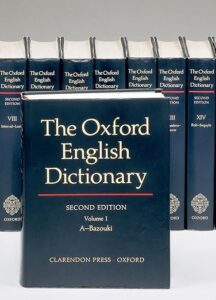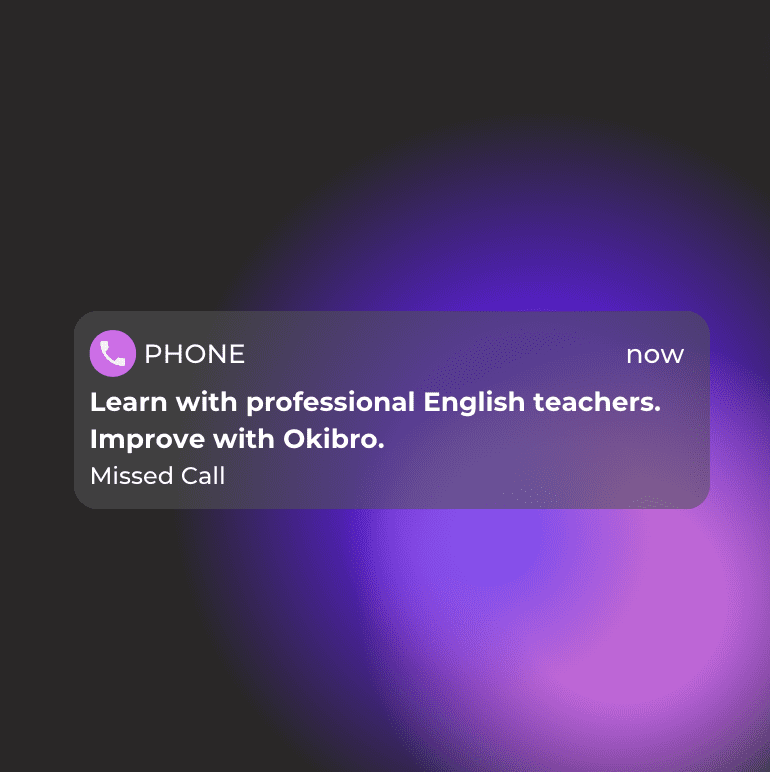How many words are there in the English language
Did You know the English language has some pretty wild words?
Take “antidisestablishmentarianism” – it’s one of the longest words and a real tongue-twister.
Consider “floccinaucinihilipilification” – it’s one of THE MOST UNUSUAL words, meaning the act of considering something to be worthless.
OR…
Have You ever heard of…
“Hippopotomonstrosesquippedaliophobia”?
Huh?
Ironically, BUT… it’s the fear of long words and is a long word itself!
Whether You are learning English to take a new step in Your career…
OR… You are learning it just for fun…
OR… You are a native speaker curious about how many words there are in the English language…
You are in THE RIGHT place.
Here at Okibro, we strive to help people learn more about the English language AND improve their conversational practice.
Through content on our blog and DAILY 10-minute conversational classes (just 10 minutes per day!), You CAN improve Your English.
10 minutes per day with Okibro… In a few months, You will notice that You are speaking MORE fluently than before.
And…
I have tons of useful information about English as well.
Are You learning English from scratch? I’ve gathered a collection of the easiest books for beginner English learners.
Do You feel a fear of speaking English? Learn how to overcome it in our article “How to Overcome the Fear of Speaking English.”
Looking for something fun? Check out my collection of memes about learning English.
Today, I found an awesome topic for You: “How many words are there in the English language?”
It’s important to know because understanding this can help You set goals and plan Your English learning journey.
How?
Listen… by learning the number of words in English and understanding how many words people typically use in their daily routines, You may set goals for Your OWN English learning journey.
So, are You ready to dive into this word whirlpool and find out just how deep it goes?
Let’s embark on this exciting quest together!
Contents
Discovering Old English: A Language Time Machine
Imagine hopping into a time machine and zipping through the history of English…
From the ancient Anglo-Saxons to today’s emoji-filled texts, it’s a wild ride.
However…
Did You know invasions, like the Vikings and the Normans, brought a ton of new words to English?
Yep, even “sky” is a Viking gift…
10 Common English Words With Foreign Origin
Ketchup – This popular condiment actually comes from the Hokkien Chinese word “kê-tsiap,” a type of fish sauce.
*Next time You dip Your fries, think of its Chinese origins
Yoga – Stretching from ancient India, “yoga” comes from the Sanskrit word “yuj,” meaning to join or unite.
*Talk about a word that’s as flexible as the activity.
Sofa – Time to get comfy with a word from the Arabic “ṣuffah,” meaning bench.
*The next time You lounge on a sofa, You’re experiencing a bit of Arabic culture. Ok?
Robot – This word comes from the Czech word “robota,” meaning forced labor. It was first used in a play about mechanical workers.
Safari – Adventure, anyone? “Safari” comes from the Swahili word for journey, which in turn comes from Arabic.
*It’s a long trip from Africa to the English language! Right?
Jungle – The word for this dense, wild forest comes from the Hindi “jangal,” meaning uncultivated land.
Tattoo – Inked from the Polynesian word “tatau,” meaning to mark or strike.
Ballet – Pirouetting from the French word “ballet,” which itself comes from Italian.
Kindergarten – From the German words “Kinder” (children) and “Garten” (garden), this word plants the idea of a garden where kids grow and learn.
Guru – Another word from Sanskrit, “guru” means a teacher or master.
*And… fast-forward to today: technology and pop culture keep adding COOL new words.
From “selfie” to “blogosphere,” the English language is always evolving.
Keep reading.
The 10 Best Words that Internet and Pop Culture Have Given to English
Selfie – Born in the age of smartphones, “selfie” refers to a self-portrait photograph.
*It’s a snapshot of how technology has changed the way we capture moments.
Emoji – Originating from Japanese, these digital icons have revolutionized the way we express emotions in texts and online.
Hashtag – Thanks to social media, the humble pound sign (#) got a trendy makeover as the “hashtag,” changing the way we categorize and discover content online.
Blog – Shortened from “weblog,” this term describes a personal or informational website.
*It’s like a digital journal or magazine for the internet era. Don’t You think?
Vlog – A blend of “video” and “blog,” vlogs are essentially video diaries on platforms like YouTube, adding a visual twist to personal storytelling.
App – Short for “application,” this term now commonly refers to software for smartphones and tablets, showing how tech language can become everyday lingo.
Meme – Originally a scientific term from Richard Dawkins, it’s now known as a viral internet idea, showcasing how language evolves with culture.
Streaming – From music to movies, streaming services have revolutionized media consumption, making entertainment more accessible than ever.
Podcast – A blend of “iPod” and “broadcast,” podcasts are the modern equivalent of radio shows, tailored for digital and on-the-go listening.
Google – This search engine’s name became so synonymous with online searching that “to google” is now a widely recognized verb for searching the internet.
How many words are there in the English language?
Guess what? Experts from Harvard University and Google said English has over a million words – that’s like having a mega-sized word party!
And… get this: we’re adding about 8,500 new words every year.
Let’s dive into numbers.
English Wiktionary
Check this out – the English Wiktionary is stacked! It’s got 780,489 gloss entries and a whopping 1,439,188 definitions in total.
Webster’s Third New International Dictionary

This epic, no-shortcuts dictionary is packing over 476,000 entries – talk about word overload!
And get this:
They’ve even thrown in a bunch of new words and meanings in their updated Addenda Section.
This dictionary is like a history book for words, with 140,000 stories about where words came from (that’s called etymologies, by the way).
*Plus, it’s got 200,000 examples and quotes showing how these words are used in REAL LIFE.
The American Heritage Dictionary of the English Language

Moving on to The American Heritage Dictionary of the English Language. In the intro to the 4th and 5th editions, they mention adding more than 10,000 new words.
So… for the 5th edition, they’re rocking more than 370,000 words.
Oxford English Dictionary

Okay, the Oxford English Dictionary (Second Edition) is another biggie. It’s got 273,000 headwords.
Out of these, 171,476 are current, 47,156 are old-school words, and about 9,500 are derivatives listed as subentries.
The dictionary also has 157,000 combinations and derivatives in bold, plus 169,000 phrases and combinations in bold italic, adding up to over 600,000 word-forms.
Mind-blowing, huh?
The Grand Total?
Some say English might have around 1 million words. To put that in perspective, if each word was a second, You’d need about 11 and a half days to count them all.
OR…
If each word was a step, You’d almost walk the circumference of the Earth (about 40,000 km)!
“English has over a quarter million fresh words, and there are half a million newbies worldwide.”
How many words people actually use every day?
If You’re around 20 years old and speak English, You’re probably using about 42,000 words.
*Yeah, that’s like having a whole library in Your head!
Susie Dent, a word expert, said that while You might know around 40,000 words, You’re likely using half of that in Your daily chats.
Now, grown-ups typically use between 20,000 and 30,000 words.
And here’s some great news for You if You’re learning English: You can boost Your word count too!
Wanna level up Your English game?
Jump into Okibro and start learning English online. Okibro rocks at helping You boost Your English skills. It offers wicked tools that make learning NEW words and grammar super fun and easy.
Now…
Actually…
Just for fun…
Are You ready to test Your word wizardry skills?
Dive into our quirky quiz, “Is This a Real Word?”, where You’ll encounter some of the most bizarre and unheard-of words in the English language.
But here’s the twist – not all of these words are real!
Quiz: “Is This a Real Word?”
NOTE: Please, have patience. You will see results after You answer 10 quiz questions.
The Evolving English Lexicon: Emojis, Hashtags, and Text-Speak
As we count the words in the English language, let’s not overlook the latest players:
Emojis…
Hashtags…
And text-speak…
These aren’t just trendy add-ons; they’re reshaping our vocabulary right before our eyes!
🚀 Emojis, for instance, have become the ultimate mood expressers, adding color and emotion to our messages.
Hashtags have turned into a social media compass, guiding us through the online jungle.
And text-speak? It’s the speedy, fun language of the digital age. LOL, BRB, TTYL…
These aren’t just letters, they’re the new words of our generation!
New Kids on the Block: Neologisms
10 Great Examples of Modern-Day Neologisms
Bingeable – Can’t stop watching that new series? It’s totally bingeable! This term describes shows or series that are so good, You just can’t watch one episode.
Photobomb – When You sneak into someone else’s photo unexpectedly, You’re photobombing! It’s the ultimate surprise cameo in a picture.
Hangry – When You’re so hungry it makes You angry? That’s hangry. It’s the perfect blend of hungry and angry, and totally relatable.
Mansplain – Ever had something explained to You in a condescending way, especially when You already know all about it? That’s mansplaining.
Facepalm – When something is so ridiculous or embarrassingly obvious, the only response is to slap Your forehead. Welcome to the facepalm moment.
Textrovert – Shy in person but a chatterbox via text messages? You might be a textrovert, someone who’s more outgoing and expressive in texts.
Frenemy – Part friend, part enemy, frenemies are those complicated relationships where You’re friendly on the surface but rivals at heart.
Adulting – Paying bills, making appointments, and doing chores? That’s adulting, the practice of handling typical adult responsibilities.
Vaguebooking – Posting something super vague on social media to get attention? That’s vaguebooking, a blend of vague and Facebooking.
Glamping – Love the outdoors but also love Your comforts? Glamping (glamorous camping) is Your go-to, offering a luxury take on traditional camping.
It’s important.
But more importantly… consider how You might use knowledge about the number of words in English.
In short…
I conducted an experiment and found out that I could learn 100 words per week by spending half an hour per day.
From this article, You know that the average person uses 20,000 words in their regular life.
So, in my case, I would need 200 weeks, or 4 years, if I am going to learn a foreign language from scratch.
Too much?
Too hard?
No worries.
“A journey of a thousand miles begins with a single step.” Right?
Take that single step.
The earlier You take it, the sooner You’ll reach Your destination.
Remember, here at Okibro, You will always find USEFUL information about learning English.
In the near future, I am going to share stories of my friends who are learning English and how they struggle on this long and interesting journey…
For now, check out Okibro’s AI speaking partner to improve Your conversational skills.
Stay connected.
Bye!

